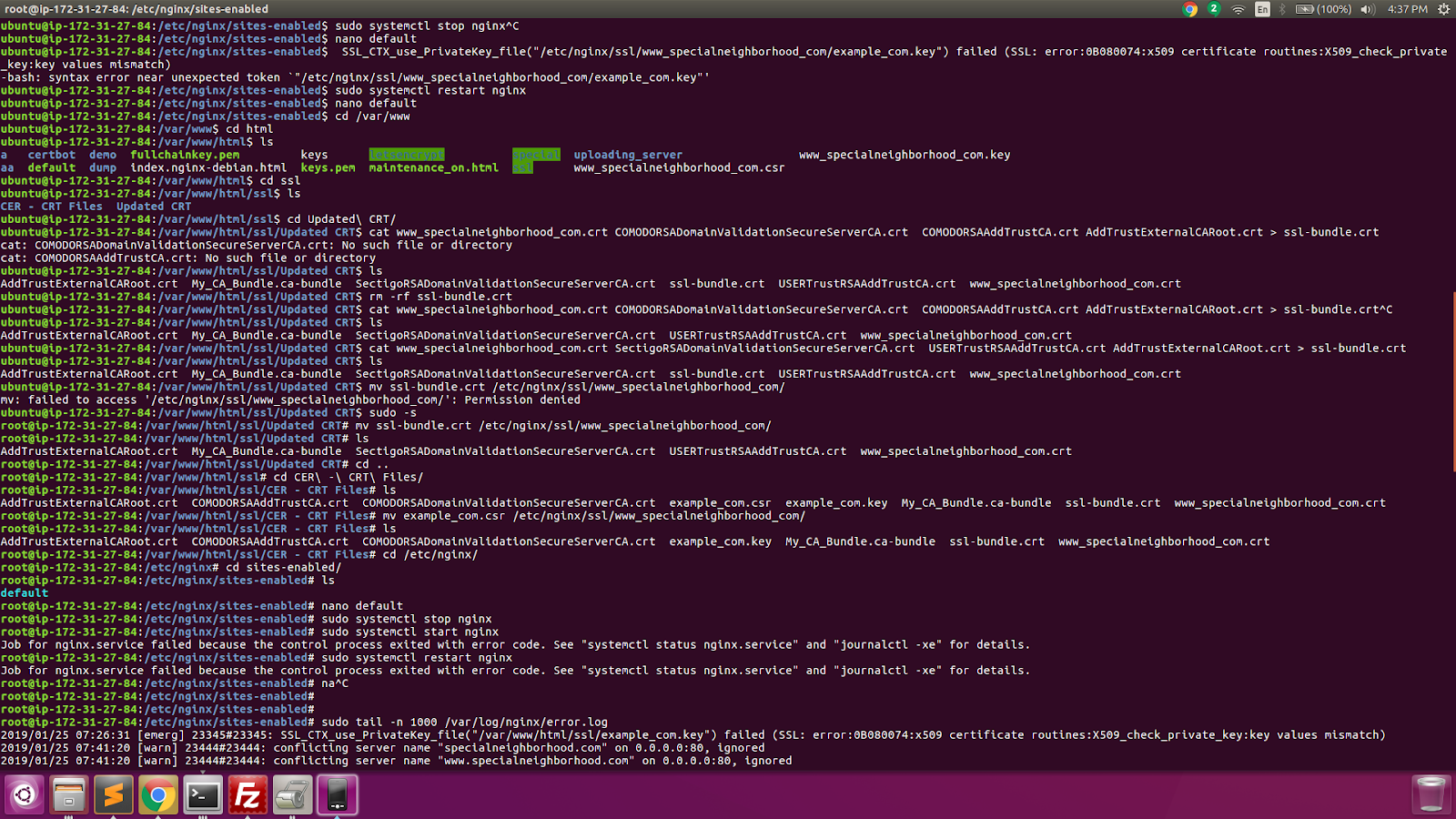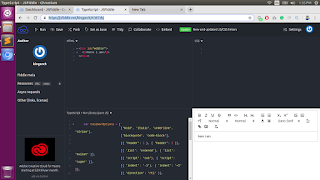Setting up Orthanc server on Ubuntu 16
Setting up Orthanc server on Ubuntu 16.
# How to compile, install and run newest version of Orthanc DICOM server
# from Github source in Ubuntu 16.04 LTS
cd
sudo apt-get update
sudo apt-get install build-essential unzip cmake mercurial uuid-dev libcurl4-openssl-dev liblua5.1-0-dev libgtest-dev libpng-dev libsqlite3-dev libssl-dev libjpeg-dev zlib1g-dev libdcmtk2-dev libboost-all-dev libwrap0-dev libcharls-dev libjsoncpp-dev libpugixml-dev doxygen qupzilla
sudo rm -rf Orthanc*
sudo apt-get purge orthanc
git clone https://github.com/jodogne/OrthancMirror.git
mkdir ~/OrthancBuild
cd ~/OrthancBuild/
cmake -DSTATIC_BUILD=ON -DCMAKE_BUILD_TYPE=Release ~/OrthancMirror/
sudo make
sudo make doc
./Orthanc --version
./Orthanc &
qupzilla http://localhost:8042/app/explorer.html
# press ESC key twice to ignore warning messages about Mozilla Firefox
# when using the file upload function
Original Post AT:
https://mark911.wordpress.com/2016/07/13/how-to-compile-install-and-run-newest-version-of-orthanc-dicom-server-from-github-source-in-ubuntu-16-04-lts/
To create a Configuration file with terminal
//Reference link: http://book.orthanc-server.com/users/configuration.html#configuration
Orthanc --config=Configuration.json
// This will create the configuration.json file
//After creating this, we need to make changes in the Newly created file Configuration.json file.
//Reference link: http://book.orthanc-server.com/faq/authentication.html
We need to make changes in Configuration.json file in Resources inside OrthancMirror folder.
//Reference link for changes to be done-
https://wiki.chpc.utah.edu/display/~u0064824/Orthanc+Configuration
{ /** * General configuration of Orthanc **/ // The logical name of this instance of Orthanc. This one is // displayed in Orthanc Explorer and at the URI "/system". "Name" : "CHPC Orthanc", "RemoteAccessAllowed" : true, // "AuthenticationEnabled" : true, // "RegisteredUsers" : { // "admin" : "fakepassword" // }, // Path to the directory that holds the heavyweight files // (i.e. the raw DICOM instances) "StorageDirectory" : "/var/lib/orthanc/db-v6", // Path to the directory that holds the SQLite index (if unset, // the value of StorageDirectory is used). This index could be // stored on a RAM-drive or a SSD device for performance reasons. // "IndexDirectory" : "/var/lib/orthanc/db-v6" "PostgreSQL" : { "EnableIndex" : true, "EnableStorage" : false, "Host" : "localhost", "Port" : "5432", "Database" : "orthancdb", "Username" : "orthanc", "Password" : "Notreallythepassword" }, // Enable the transparent compression of the DICOM instances "StorageCompression" : false, // Maximum size of the storage in MB (a value of "0" indicates no // limit on the storage size) "MaximumStorageSize" : 0, // Maximum number of patients that can be stored at a given time // in the storage (a value of "0" indicates no limit on the number // of patients) "MaximumPatientCount" : 0, // List of paths to the custom Lua scripts that are to be loaded // into this instance of Orthanc "LuaScripts" : [ ], // List of paths to the plugins that are to be loaded into this // instance of Orthanc (e.g. "./libPluginTest.so" for Linux, or // "./PluginTest.dll" for Windows). These paths can refer to // folders, in which case they will be scanned non-recursively to // find shared libraries. "Plugins" : [ "/usr/share/orthanc/plugins/" ], /** * Configuration of the HTTP server **/ // Enable the HTTP server. If this parameter is set to "false", // Orthanc acts as a pure DICOM server. The REST API and Orthanc // Explorer will not be available. "HttpServerEnabled" : true, // HTTP port for the REST services and for the GUI "HttpPort" : 8042, // When the following option is "true", if an error is encountered // while calling the REST API, a JSON message describing the error // is put in the HTTP answer. This feature can be disabled if the // HTTP client does not properly handles such answers. "HttpDescribeErrors" : true, // Enable HTTP compression to improve network bandwidth utilization, // at the expense of more computations on the server. Orthanc // supports the "gzip" and "deflate" HTTP encodings. "HttpCompressionEnabled" : true, /** * Configuration of the DICOM server **/ // Enable the DICOM server. If this parameter is set to "false", // Orthanc acts as a pure REST server. It will not be possible to // receive files or to do query/retrieve through the DICOM protocol. "DicomServerEnabled" : true, // The DICOM Application Entity Title "DicomAet" : "ORCHPC", // Check whether the called AET corresponds during a DICOM request "DicomCheckCalledAet" : false, // The DICOM port "DicomPort" : 4242, // The default encoding that is assumed for DICOM files without // "SpecificCharacterSet" DICOM tag. The allowed values are "Ascii", // "Utf8", "Latin1", "Latin2", "Latin3", "Latin4", "Latin5", // "Cyrillic", "Windows1251", "Arabic", "Greek", "Hebrew", "Thai", // "Japanese", and "Chinese". "DefaultEncoding" : "Latin1", // The transfer syntaxes that are accepted by Orthanc C-Store SCP "DeflatedTransferSyntaxAccepted" : true, "JpegTransferSyntaxAccepted" : true, "Jpeg2000TransferSyntaxAccepted" : true, "JpegLosslessTransferSyntaxAccepted" : true, "JpipTransferSyntaxAccepted" : true, "Mpeg2TransferSyntaxAccepted" : true, "RleTransferSyntaxAccepted" : true, // Whether Orthanc accepts to act as C-Store SCP for unknown storage // SOP classes (aka. "promiscuous mode") "UnknownSopClassAccepted" : false, "DicomScpTimeout" : 60, /** * Security-related options for the HTTP server **/ // Whether remote hosts can connect to the HTTP server "RemoteAccessAllowed" : true, // Whether or not SSL is enabled "SslEnabled" : false, // Path to the SSL certificate (meaningful only if SSL is enabled) // Whether or not the password protection is enabled "AuthenticationEnabled" : false, // The list of the registered users. Because Orthanc uses HTTP // Basic Authentication, the passwords are stored as plain text. "RegisteredUsers" : { // "alice" : "alicePassword" }, /** * Network topology **/ // The list of the known DICOM modalities "DicomModalities" : { /** * Uncommenting the following line would enable Orthanc to * connect to an instance of the "storescp" open-source DICOM * store (shipped in the DCMTK distribution) started by the * command line "storescp 2000". **/ // "sample" : [ "STORESCP", "localhost", 2000 ] /** * A fourth parameter is available to enable patches for a * specific PACS manufacturer. The allowed values are currently * "Generic" (default value), "StoreScp" (storescp tool from * DCMTK), "ClearCanvas", "MedInria", "Dcm4Chee", "SyngoVia", * "AgfaImpax" (Agfa IMPAX), "EFilm2" (eFilm version 2), and * "Vitrea". This parameter is case-sensitive. **/ // "clearcanvas" : [ "CLEARCANVAS", "192.168.1.1", 104, "ClearCanvas" ] }, // Whether the Orthanc SCP allows incoming C-Store requests, even // from SCU modalities it does not know about (i.e. that are not // listed in the "DicomModalities" option above) "DicomAlwaysAllowStore" : true, // Whether Orthanc checks the IP/hostname address of the remote // modality initiating a DICOM connection (as listed in the // "DicomModalities" option above). If this option is set to // "false", Orthanc only checks the AET of the remote modality. "DicomCheckModalityHost" : false, // The timeout (in seconds) after which the DICOM associations are // considered as closed by the Orthanc SCU (client) if the remote // DICOM SCP (server) does not answer. "DicomScuTimeout" : 60, // The list of the known Orthanc peers "OrthancPeers" : { /** * Each line gives the base URL of an Orthanc peer, possibly * followed by the username/password pair (if the password * protection is enabled on the peer). **/ // "peer" : [ "http://localhost:8043/", "alice", "alicePassword" ] // "peer2" : [ "http://localhost:8044/" ] }, // Parameters of the HTTP proxy to be used by Orthanc. If set to the // empty string, no HTTP proxy is used. For instance: // "HttpProxy" : "192.168.0.1:3128" // "HttpProxy" : "proxyUser:proxyPassword@192.168.0.1:3128" "HttpProxy" : "", // Set the timeout for HTTP requests issued by Orthanc (in seconds). "HttpTimeout" : 60, // Enable the verification of the peers during HTTPS requests. // Reference: http://curl.haxx.se/docs/sslcerts.html "HttpsVerifyPeers" : false, // Path to the CA (certification authority) certificates to validate // peers in HTTPS requests. From curl documentation ("--cacert" // option): "Tells curl to use the specified certificate file to // verify the peers. The file may contain multiple CA // certificates. The certificate(s) must be in PEM format." "HttpsCACertificates" : "", /** * Advanced options **/ // Dictionary of symbolic names for the user-defined metadata. Each // entry must map an unique string to an unique number between 1024 // and 65535. "UserMetadata" : { // "Sample" : 1024 }, // Dictionary of symbolic names for the user-defined types of // attached files. Each entry must map an unique string to an unique // number between 1024 and 65535. Optionally, a second argument can // provided to specify a MIME content type for the attachment. "UserContentType" : { // "sample" : 1024 // "sample2" : [ 1025, "application/pdf" ] }, // Number of seconds without receiving any instance before a // patient, a study or a series is considered as stable. "StableAge" : 60, // By default, Orthanc compares AET (Application Entity Titles) in a // case-insensitive way. Setting this option to "true" will enable // case-sensitive matching. "StrictAetComparison" : false, // When the following option is "true", the MD5 of the DICOM files // will be computed and stored in the Orthanc database. This // information can be used to detect disk corruption, at the price // of a small performance overhead. "StoreMD5ForAttachments" : true, // The maximum number of results for a single C-FIND request at the // Patient, Study or Series level. Setting this option to "0" means // no limit. "LimitFindResults" : 0, // The maximum number of results for a single C-FIND request at the // Instance level. Setting this option to "0" means no limit. "LimitFindInstances" : 0, // The maximum number of active jobs in the Orthanc scheduler. When // this limit is reached, the addition of new jobs is blocked until // some job finishes. "LimitJobs" : 10, // If this option is set to "false", Orthanc will not log the // resources that are exported to other DICOM modalities of Orthanc // peers in the URI "/exports". This is useful to prevent the index // to grow indefinitely in auto-routing tasks. "LogExportedResources" : true, // Enable or disable HTTP Keep-Alive (deprecated). Set this option // to "true" only in the case of high HTTP loads. "KeepAlive" : false, // If this option is set to "false", Orthanc will run in index-only // mode. The DICOM files will not be stored on the drive. Note that // this option might prevent the upgrade to newer versions of Orthanc. "StoreDicom" : true, // DICOM associations are kept open as long as new DICOM commands // are issued. This option sets the number of seconds of inactivity // to wait before automatically closing a DICOM association. If set // to 0, the connection is closed immediately. "DicomAssociationCloseDelay" : 5, // Maximum number of query/retrieve DICOM requests that are // maintained by Orthanc. The least recently used requests get // deleted as new requests are issued. "QueryRetrieveSize" : 10, // When handling a C-Find SCP request, setting this flag to "true" // will enable case-sensitive match for PN value representation // (such as PatientName). By default, the search is // case-insensitive, which does not follow the DICOM standard. "CaseSensitivePN" : false, // Register a new tag in the dictionary of DICOM tags that are known // to Orthanc. Each line must contain the tag (formatted as 2 // hexadecimal numbers), the value representation (2 upcase // characters), a nickname for the tag, possibly the minimum // multiplicity (> 0 with defaults to 1), and possibly the maximum // multiplicity (0 means arbitrary multiplicity, defaults to 1). "Dictionary" : { // "0014,1020" : [ "DA", "ValidationExpiryDate", 1, 1 ] }}//After adding this stop orthanc servedr first.then restart oit with following command
Orthanc ./Configuration.json
//run orthanc with the configuration.json


how run orthanc after installation
ReplyDelete----
https://www.techno.rn.tn